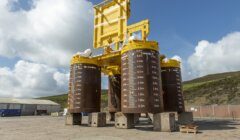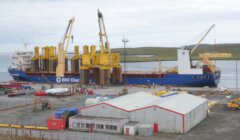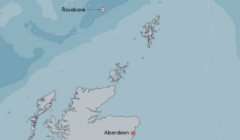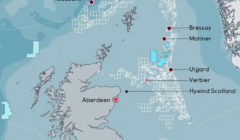Viewpoint / Now is the time to use our voice
Local Green councillor Alex Armitage offers his views on why he is taking a stand against the proposed Rosebank oil field to the west of Shetland
Today at 5pm I will be joining a demonstration against Rosebank at the Market Cross in Lerwick.
Oil and gas has supported Shetland for so many decades. Our roads, leisure centres and schools, our Charitable Trust and our huge council reserve fund all come from money from the oil and gas sector.
Hundreds of workers in Shetland still have well paid jobs in the industry. Many retired workers have good pensions and valuable shares in oil and gas companies.
So why am I trying to spoil the party? Climate breakdown is here and now. The severe storms and snowfall that many parts of Shetland experienced this winter, resulting in power cuts for days on end, are an example of the kind of freak weather events that are being made more likely by climate breakdown.
As a community in Shetland, we were resilient to the challenge that this storm brought, with the support of a national major incident being called and the mobilisation of dozens of workers who were shipped in from Scotland, none of whom had ever seen anything like it before. Some called it apocalyptic. Last year in mainland Britain the temperature hit 40 for the first time.
This year the sea temperature around Shetland is almost a whole degree warmer than usual. This should worry us all greatly, given that our economy is highly dependent on a marine ecosystem that produces fish.
Professor Ray Hilborn, a fisheries scientist at the University of Washington and ardent advocate of the fishing industry, who came to give a talk at UHI in Scalloway last year, said that climate breakdown is the biggest threat that faces the fishing industry. Even amid the current threats that the fishing industry faces, it’s not hard to see why.
What worries me most is the plight of the billions of people in the Global South, who do not live in societies that are as resilient as ours. When disasters inevitably strike, be they severe rainfall and flooding as seen in Pakistan last year, or crop failures and hunger, or hurricanes that lash the Caribbean islands with ever more ferocity each year, people suffer.
Surely we must do everything we possibly can to reduce our carbon emissions and stop the breakdown of our climate? The one thing that climate scientists are crystal clear on is that in order to decarbonise effectively we must move rapidly away from burning fossil fuels, and this will require us to leave the vast majority of undeveloped coal, oil and gas in the ground. We can’t make an exception for Rosebank.
Living in a society in which our cars, tractors, ferries, fishing boats, planes and homes cannot function without burning fossil fuels, it’s easy to feel like giving up. But if we’re serious about protecting life on earth, including us and our children, giving up is not an option.
The truth is, we can and must learn to live, individually and collectively, in a way that limits the emissions of deadly carbon into the atmosphere. In the UK and locally in Shetland, we have a plan to reduce our carbon emissions.
We have the technology; we have the knowledge. What we don’t have, yet, is political leaders with the guts to lead the change. Leaving Rosebank’s oil in the ground is a real test of that political leadership.
It is a statement of intent that we as a country are committed to decarbonising our society. It’s also a statement of international leadership, setting an example to the rest of the world. For me, the arguments against developing Rosebank are obvious – but what about the other side of the debate?
Hysterical argument number one from the Conservative government is that allowing Equinor (the Norwegian state oil company that holds the license) to drill at Rosebank will give the UK more energy security, and lower people’s energy bills.
Nothing could be further from the truth. Equinor plans to load Rosebank oil onto tankers out at sea, and ship if off to wherever in the world it can get the best price. The oil won’t touch Shetland and will do nothing to insulate us from the effects of Putin’s war in Ukraine.
Only home insulation, renewables and less consumption will do that. Another argument that I often hear is that we need petrochemicals for many important uses such as plastics, and the precursor chemicals for making medicines, lubricating oil for machinery and other essential products, including items such as wind turbine blades and bitumen for making new cycle paths.
This argument misses the point that the majority of oil and gas that is extracted is done so for burning – between 75 per cent and 80 per cent according to most estimates. Rosebank is only economically viable on the premise that its oil and gas are burned: if all we need is petrochemicals, we don’t need Rosebank.
A more genuinely held argument for drilling at Rosebank, but nonetheless one that must be challenged head on, is that extracting fossil fuels in the higher regulatory settings of north western Europe, where safety and environmental standards are better, is much less damaging than importing oil and gas from sociopathic regimes in Russia and the Middle East.
Equinor even claim that oil extraction from Rosebank will be electrified using green energy, further reducing the climate impact of the oil. The truth is that Equinor have made no serious plans to electrify extraction at Rosebank.
Talk of electrification is no more than a glossy public relations stunt, to hide the fact that adherence to environmental standards in British waters has been poor, with hundreds of tonnes of oil being spilled to sea in excess of legal limits in the last five years, and ongoing flaring of countless tonnes of natural gas, wasted into the skies above the north Atlantic.
The real problems with this argument are firstly that because decarbonisation is already happening so fast, and is forecast to accelerate in coming years, it is realistically possible that Rosebank oil will not be needed.
Secondly, it detracts from the fact that ultimately we must keep oil in the ground if we are to limit the devastating effects of climate change. If we say we are going to extract oil from Rosebank, that necessarily means that someone else will have to keep their fossil fuels in the ground. The reality is that the UK and Norway are developed economies that are the most prepared to make the switch to renewables.
It is the UK and Norway that have real power to make this vital first step towards a better world. The decision to forgo the profits that Rosebank could bring in the short term, in favour of taking action to protect our planet, is one that seems nonsensical in terms of 20th century thinking centred on economic growth – but makes complete sense when approached with a 21st century mindset centred on human wellbeing and sustainability.
Slowly, attitudes are beginning to shift. Just last week, Shetland Islands Council’s fund managers, who are responsible for profitably investing hundreds of millions of pounds of our oil money, came to Shetland and told elected members in the council chamber that fossil fuels needed to be left in the ground and that they would not hold shares in oil companies that were planning on developing new fields.
When even the most committed of capitalists say that fossil fuels must be kept in the ground, maybe we should all sit up, listen and act.
With our economic history and our geographic location, Shetland has an outsized political voice on this issue. Now is the time to use it.
Do you have any views to share in response? Leave a comment below or write to letters@shetnews.co.uk.



















































































